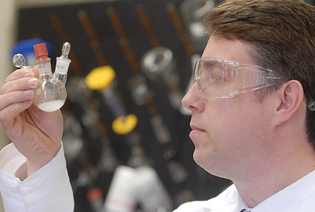
Michael Marsland
Paul Anastas, who heads Yale’s Center for Green Chemistry and Green Engineering, recently won the Volvo Environmental Prize for his pioneering work.
View full image
In 1990, Paul Anastas looked up from his work in the Office of Toxic Substances at the Environmental Protection Agency and noted a baffling absence.
Chemists were central in the description and measurement of environmental problems. They often worked to explain how much pollution filled the air over one city or another, or how many chemicals dirtied this waterway or that one. “But there wasn’t much involvement of chemists on the solutions side of things,” he says. “I used to say: who has more influence over a book’s outcome than the author? Who has more impact on a building than the architect? And who has the most to do with chemistry and chemicals if not the molecular architects that design and build them?”
So Anastas, now director of Yale’s Center for Green Chemistry and Green Engineering, launched a “ridiculously small” division within the EPA where chemists engaged environmental problems not by regulating them, but by designing them out of existence. Thirty years later, he has been awarded the 2021 Volvo Environment Prize, an award of 1.5 million kroner (about $160,000) given by the Swedish automaker for research in sustainability. The prize recognizes the transformative effect of his work in every corner of the economy.
“I don’t feel this prize recognizes me as an individual, but everyone in green chemistry, all of the people who have been redesigning tomorrow to be more sustainable,” he says. “The prize is really about the global community.”
Fundamental to green chemistry—a term Anastas coined while at the EPA—is recognizing that the design and use of molecules takes place within an immensely complex ecological system. The best approach to molecular design, then, eliminates, or at least reduces, the total production of hazardous substances by taking this system into account. Green chemistry, like the field of sustainability writ large, aims to solve problems without creating other problems that will later need to be solved.
In December 2020, the EPA celebrated its 50th anniversary. Anastas marked the occasion by writing an article praising the remarkable successes of his former employer while critiquing its current structure, which remains focused on managing problems rather than generating solutions. “In some ways, it was scathing, but it starts off with profuse praise, and both are true,” he says. “The past has been miraculous and the future has to be different.”
 loading
loading